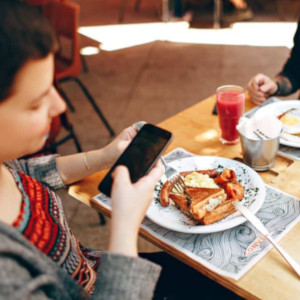Most folks who have tween and teen kids already know this, but science has now caught up with reality. There’s now clinical proof that children who use ‘personal technology’ at mealtimes are seriously distracted, and may not be getting enough to eat. But it’s not just them…
 Distracted eating is a very real problem for folks of all ages…
Distracted eating is a very real problem for folks of all ages…
Remember the story, a few months ago, about how some ‘family’ restaurants were instituting ‘check your phone at the door’ policies in an effort to get parents and kids talking to each other at mealtimes? That effort was sparked entirely by subjective observations and water cooler conversation, but now scientists have now explored the underlying principle behind it and come up with some solid findings that are troubling, to say the least.
What they did
Researchers at University of Illinois at Urbana-Champaign wanted to know exactly what effect the use of technology at mealtimes was having on young adults. So they asked 119 of them to participate in a direct comparison experiment in which they first played a computer game while eating, and later were served the same meal without access to their tech.
According to an abstract of the study report, “The game, called Rapid Visual Information Processing [RVIP], tests users’ visual sustained attention and working memory and has been used extensively by researchers in evaluating people for problems such as Alzheimer’s disease and attention-deficit disorder. The game randomly flashes series of digits on the computer screen at the rate of one per second. Participants in the study were instructed to hit the space bar on the keyboard whenever they saw three consecutive odd numbers appear.”
“It’s fairly simple but distracting enough that you have to really be watching it to make sure that you don’t miss a number and are mentally keeping track,” report Lead Author Carli A. Liguori said. “That was a big question for us going into this – how do you ensure that the participant is distracted? And the RVIP was a good solution for that.”
After a half hour ‘rest period’, participants were asked to recall how many food units (Mini Quiches) they had been given and how many they had consumed. They were also asked about their feelings of hunger and fullness during the experiment, and how much they had enjoyed the meal.
What they found
Ligouri initially thought that people who played the game while eating would eat more, retain less about what they ate and how much they ate, and enjoy it less. But the opposite was the case: the distracted diners ate less then non-distracted diners. They did, however, retain less detail about what they ate and how they felt about it.
The abstract also notes, “participants’ consumption on their second visit was affected by which activity they had performed during their initial visit. The people who engaged in distracted eating on their first visit ate significantly less than their counterparts who did not experience the distracted eating condition until their second visit.”
“It really seemed to matter whether they were in [the] distracted eating group first,” said Liguori. “Something about being distracted on their initial visit really seemed to change the amount they consumed during the non-distracted meal. There may be a potent carryover effect between the mechanism of distraction and the novelty of the food served.”
The takeaway
Along with the obvious finding that distracted eating causes kids to eat less, Ligouri says she thinks she has demonstrated that ‘distracted eating’ and ‘mindless eating’ – terms that have up to now been used interchangeably – are not the same thing at all. Previous studies by other investigators compared the dining habits of participants to those of other participants, rather than exposing the same participants to both distracted and non-distracted meals. It was those studies that suggested to Ligouri that distracted diners would eat more.
My take
I guess we all know how distractions can ruin a meal, or at least make it less memorable and less enjoyable. It can be something as obvious as a crying child in the restaurant, or as subtle as the smell of the perfume being worn by someone at a nearby table. My most distracted meal (to date) was caused by the presence of a former lover at a table across the dining room from mine. He never copped to me being there, I don’t think; certainly didn’t show it. But his mere presence ensured that I still retain nasty memories about the meal, and I couldn’t tell you what I ate if you offered me a million dollars. The problem of distracted eating is one that effects all ages…
~ Maggie J.

